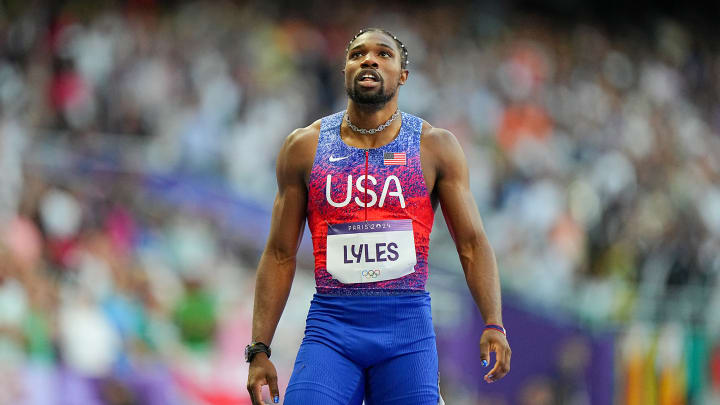Don’t Blame COVID-19 for Noah Lyles’s Olympic Bronze in the 200 Meters

PARIS — Excuses? Nah. Noah Lyles’s positive test for COVID-19 is not an excuse for his surprising third-place performance in the men’s 200-meter final on Thursday night. But it was a factor—and there is a big difference, in sports, between factors and excuses.
Claiming he lost because he’s never run on a purple track would be an excuse. Blaming refs is almost always an excuse. Complaining that your hotel-room pillow was too soft, your bus driver drove too slow, or your socks were too tight: Excuse, excuse, excuse.
What happened to Lyles is just part of sports, which are designed, in the most basic sense, to measure which humans perform specific tasks best at a specific time on a specific day. Sometimes you tweak your ankle, sometimes you’re distracted by something happening in your personal life, and sometimes you’re an asthmatic who gets COVID-19 in the most important week of your career. If the International Olympic Committee insisted that all participants be at their mental and physical best at the moment of competition, no event would ever take place.
So congrats to Botswana’s Letsile Tebogo, whose time of 19.46 seconds was more than worthy of gold. Congrats to American Kenny Bednarek for grabbing silver and congrats to Lyles for somehow running a 200 in 19.70 seconds, just two days after he—his words—“woke up in the middle of the night just feeling, really, chills, aching, sore throat.” Lyles bounced into the stadium like he always does. But by the end of the race, he appeared to be laboring.
“This is by far the best day I felt out of the last three days,” he said. “I still wouldn't say I'm 100%, but I’d definitely say I'm closer to like 90 to 95 percent … I'm more proud of myself than anything, coming out and [getting] the bronze medal.”
He should be proud. He should also rest up, see if he feels strong enough to run in the 4X100 relay Friday, and definitely not read the next paragraph.
Bednarek and Lyles have faced each other in the 200-meter dash 13 times. Lyles has finished ahead of Bednarek in 11 of them. The other two were in the Olympics.
Lyles thrives on showmanship, and at the Tokyo Olympics, there were no fans and therefore no show. The atmosphere in Paris was much more to his liking. He won the 100 meters by one sixteenth of a goose bump. The 200 figured to be the easier race for him; after the 100, he had promised he would win. (Or at least he promised that everybody else in the final would be unhappy with the result, which I took as a promise he would win.)
Lyles did not announce he tested positive until after the race. His coaches, his doctors, his family and his girlfriend, Junelle Bromfield—a Jamaican sprinter who is also competing in Paris—knew about his diagnosis. But they also knew that the 200 would happen whether he ran or not. Lyles said he never considered withdrawing.
When a reporter asked if his COVID-19 medication was PAXLOVID, Lyles paused, said “I can't remember the name of it,” and laughed at the absurdity of it. An official near him confirmed it was PAXLOVID.
“Even Junelle was saying that I was coughing through the night last night,” Lyles said. “I thought I had a good night's sleep, but she said she had to keep moving me through the night to make sure that I would stop coughing.”
Because Lyles basically guaranteed a victory and ended up getting bronze, there will inevitably be whispers that COVID-19 was a convenient excuse. The theory makes sense until you think about it for, oh, two seconds.
Quickly now: Lyles’s asthma has been well-documented. COVID-19 symptoms can be especially severe for patients with asthma. Lyles left the Olympic Village, stayed in a hotel, changed his preparatory regimen before the biggest 200 of his career—and then, after he finished, he fell to the track and was taken out of the stadium in a wheelchair. He put on a mask and told reporters if he wasn’t healthy enough to run in the 4X100 relay Friday, he would tell the coaches.
Of course he was sick, and of course it affected him—and of course it doesn’t really matter. They held the men’s 200 at the Olympics this week, Noah Lyles was the third-fastest man in the final and that’s that.
